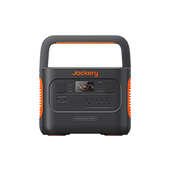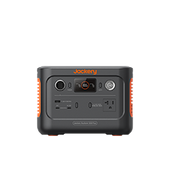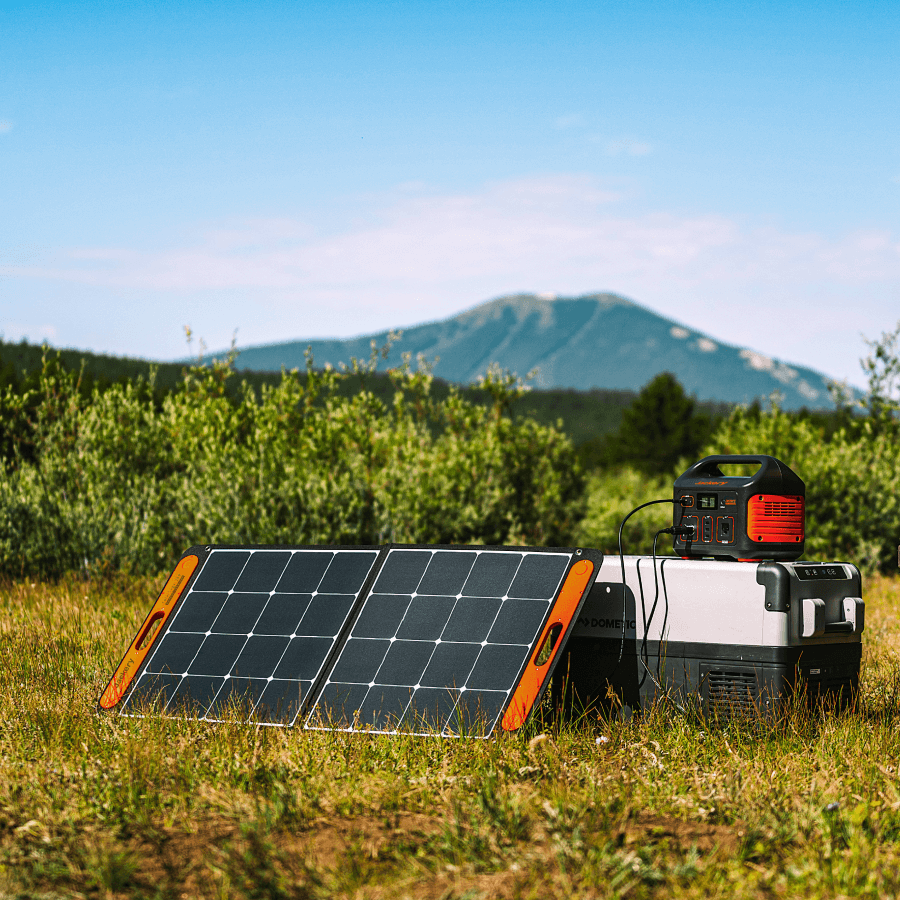A continuous positive airway pressure machine, known simply as a CPAP, is used as a treatment method for those who are diagnosed with sleep apnea. This device essentially keeps your airway open with fresh oxygen while you sleep. With the right setup, you can camp or spend the night anywhere you choose with your CPAP machine.
Camping Power Supply: Two Ways to Power Your CPAP Machine
Having a CPAP machine shouldn't keep you from spending a night out under the stars. In fact, there are two great options for powering your machine during overnight hours. These include a generator and a portable battery for your CPAP machine. Don't let your sleep apnea keep you from spending a night away from home.
Connecting to a Solar Generator for Camping
Using a generator is one of the simplest methods for powering your CPAP machine while spending a night in the great outdoors. This stand-alone electric source provides a reliable stream of electricity to power your CPAP machine throughout the entire night. A solar-powered generator is one of the best types to take into the woods.
The Jackery Solar Generator 1000 v2 is a relatively light and easy-to-carry generator. You can charge it via the included solar panels, your car's power outlet, or even charge it at home in a wall outlet before you leave for your camping trip. Unlike other generators, the Jackery Solar Generator 1000 v2 is super quiet, with only 30dB of noise, so you won't wake your camping buddies.
With the right generator, you can ensure that your CPAP machine works flawlessly, no matter where you're at. The best part is that you'll love getting a good night's sleep and the flexibility of staying wherever your heart desires. No longer does your sleep apnea need to hold you back from taking on new adventures in life. Now, you've got an easy way to plan life on your schedule.
Using a Portable CPAP Battery for Camping
Another option for powering your CPAP machine while enjoying a night out in the woods is with a portable battery. Depending on the specific type of CPAP machine that you have, you may be able to purchase a compatible portable battery. You can simply plug your machine into the battery and enjoy comfort away from your sleep apnea all night long.
Most portable batteries can be easily charged at home or through your car's USB port. So, you can essentially charge up your portable battery before heading into the woods so that you're prepared to stay throughout the night.

Tips for Bringing Your CPAP Camping
When it comes to camping with your CPAP machine, there are a few tips that you'll want to implement for the best experience possible. Realize that the more planning you do, the better your camping experience is going to be when using your CPAP machine for the first time away from home.
Plan Your Trip Accordingly
When you're scheduling a trip into the woods when you have sleep apnea, planning is your best friend. It's highly recommended that you take the time to determine how you're going to power your machine via electric or solar. You want to ensure that you have all of the necessary components, such as a solar generator, packed and charged up.
Even if you only plan on spending a night or two in the woods, do yourself a favor and prepare for more. Pack extra filters, headgear, tubing, and even an extra CPAP mask. You never know what may happen while in the woods. Since these items are relatively lightweight, it only makes sense to bring them along just in case.
Make Sure Your CPAP Battery for Camping is Fully Charged
If you're going to be using a portable battery to power your CPAP machine, then you'll want to take the time to ensure that it's properly charged. By charging it before you leave home, you can ensure that it's ready to go and that you don't have to waste time charging it in your car or off your generator before you head to bed.
Keep Your CPAP Machine Clean and Dry
When you're going to be taking your CPAP machine out of the safety of your home, you need to be extra cautious with how you handle it. Things like water can potentially hinder your equipment's performance or even permanently damage it. Having a safe, waterproof storage container is a necessity.
Avoid Humidity
Unfortunately, water and rain aren't your only enemy when it comes to your CPAP machine functioning properly. High humidity levels can allow moisture to seep into your mask. You can counteract this effect by simply turning the humidity level down on your device. If there is too much moisture in it, simply run your device without water for a few minutes to dry it out.
Do a Test Run of Your Battery Power for the CPAP Machine at Home
Getting a portable battery for your CPAP machine can be a great way to help you enjoy spending nights outdoors and have more flexibility. However, you don't just want to pull the battery out of its box, charge it up, and head to the woods.
Rather, you should test out your portable battery a couple of nights before you leave. This will help you to discover how long your battery will last on your usual machine settings. You'll learn how long it takes to charge and so forth. The goal is to ensure that, when you leave for the woods, you know that your portable battery will work flawlessly.
Use Solar Generator for Camping as a Backup Plan
Jackery Solar Generators are ideal options for powering your CPAP machine during camping trips. They are equipped with solar panels, allowing for recharging during the day, ensuring a continuous power source for your CPAP device, even on multi-night camping adventures. These generators' lightweight and the foldable design make them easy to carry, and their clean and quiet operation makes them suitable for use in various locations.
The compact size of the Jackery Solar Generators also makes them suitable for use in smaller spaces, making them the perfect choice for overnight camping trips. With their reliable and powerful energy source, these generators are an excellent backup plan for anyone who needs to use a CPAP machine while camping.
Jackery Solar Generator 500
If you are looking for a compact solar generator that can charge essential appliances like CPAP and lights, the Jackery Solar Generator 500 has got you covered. It has a sturdy handle to ensure you can move the generator to campgrounds to power appliances for long hours. For instance, it can power a CPAP machine (40W) for around 8.5 hours, ensuring you can enjoy a peaceful sleep even if there is no nearby electricity outlet available.
Jackery Solar Generator 600 Plus
The Jackery Solar Generator 600 Plus is built with high-level outdoor durability that makes it ideal for charging appliances during outdoor camping trips. It is a lightweight, powerful, and durable charging solution that makes the solar generator ideal for outdoor fun and adventures. It weighs only 16.1 lbs and features a foldable handle that ensures the power station can be carried wherever you go. It can charge your CPAP (40W) for 10.4 hours to ensure a peaceful night’s sleep.
Jackery Solar Generator 1000 v2
The Jackery Solar Generator 1000 v2 is the next-generation charging solution that is powerful, faster, and stronger compared to other versions. If you are planning a multi-day trip and want to power the CPAP machines for long hours, the solar generator has you covered. For example, it can charge a 40W CPAP machine for 16 hours. Thanks to the large battery capacity, it can charge other campsite appliances such as lights, coolers, and even a small stove.
Conclusion
You should never let your sleep apnea keep you from enjoying adventures in life. When you get the urge to hit the woods, simply bring your CPAP machine and one of Jackery's great solar generators. You'll love the versatility they bring and the flexibility they offer for on-the-go solar charging, no matter where you decide to take your next adventure.
If you're ready to take back your independence from sleep apnea and your CPAP machine, then it's time to sign up for our newsletter. We'll share with you all the great solar generator features and products you can use to power your device. Even enjoy exclusive discounts to make your next camping adventure even more affordable.
Reply to Comments
While our current blog comment system doesn't allow for direct replies, we encourage you to leave your comments and questions. Our customer service team will address them via email promptly. Additionally, we'll compile the most frequently asked questions and provide comprehensive answers at the end of the blog post.
Comment: What would you recommend to power 2 Cpaps one at 120volts 2 Amps the other at 120 volts 1.5 amps.
Watts = Amps × Volts
CPAP 1. 120volts * 2 Amps = 240 Watts
CPAP 2. 120 volts * 1.5 amps = 180 Watts
Considering 8 hours of running time, we recommend the following portable power stations along with their respective running times. If you need to recharge the portable power station with a solar panel, you can opt for the related model's Solar Generator.
The running time is calculated when the Jackery is fully charged and is used to power the CPAP separately. The running time is for reference only; the actual time may vary depending on usage.
Explorer 2000 Plus: CPAP 1 =6.3 Hours, CPAP2=8.2 Hours
Explorer 3000 Pro: CPAP 1 =9.4 Hours, CPAP2=12.1 Hours






















































































































What would you recommend to power 2 Cpaps one at 120volts 2 Amps the other at 120 volts 1.5 amps.
I have a CPAP machine and I’m looking for options on keeping my machine going with humidity while camping. We normally camp for 7 to 14 days. How would I charge your Jack unit.
Leave a comment